Kirk Williams, a Coloradan, is an active outdoorsman, storyteller, and adventurer who courageously travels overland despite a physical mobility impairment. When Kirk was in his early twenties, he had an unfortunate mountain biking accident, broke his neck, and was relegated to a wheelchair.
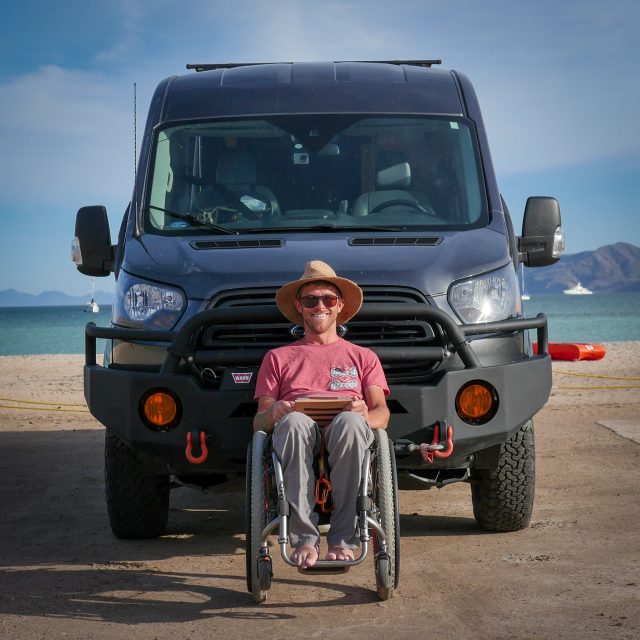
That, however, has not hindered his drive and zest for life. Kirk has driven his adapted Ford Transit 250 Cargo Van across most of the States, shipped the vehicle to Chile, drove to Ushuaia, and was heading back north via Argentina before the pandemic halted his travel plans. Kirk is still very adventurous, taking on paragliding, wheelchair rugby, and scuba diving. Kirk loves overlanding with his van, “Spock,” and as a thrill-seeker, he explores backwoods routes with his adapted side-by-side Polaris Razor and his hand-cycle, reaching up to 35 mph on some trails. Kirk also excels in drone videography and photography and raises awareness with the Walkabout Foundation, an organization that shares his common philosophy to educate and help people in need of wheelchairs and primary healthcare.

Kirk is not afraid to talk about the challenges he faces daily; he has a great sense of humor and is quick to note that he is living life as best he can and is privileged to be able to explore. I believe that it is his hard-working and modest nature that keeps him wandering the planet with his beautiful Labrador, Maddox.
Tell us about yourself
I am Kirk Williams, and I live in Durango, Colorado. I am a 35-year-old photographer, adventure traveler, and quadriplegic. I broke my neck in 2009 during a mountain biking accident, and I don’t really have much use of anything below my chest. Although my hands don’t work very well, I can still get by.
How did you begin traveling, and when did you decide that overland travel would be a large part of your future?
I used to camp and travel a lot before I was in a wheelchair and was always out in nature, either mountain biking, skiing or climbing, so I tend to joke that overlanding found me more than I found it.
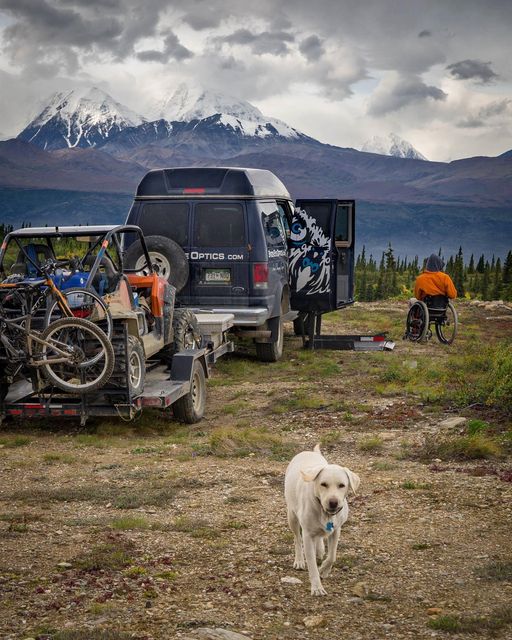
After breaking my neck, my first vehicle was a full-size van, and I quickly realized I didn’t use the seats at the back. I missed getting out into nature, camping with my friends, and being around campfires, so I took out the back seats and built a bed that allowed me to sleep in my car. That was a big lightbulb moment when I realized that this would let me get back into the woods. I then started making my way up to Alaska by sleeping at friends’ houses or going camping with friends. During the Alaska trip, I was traveling with somebody into remote areas but then realized that by having a vehicle that was designed and set up to work specifically for me, allowing access between the bed and a place to go to the bathroom, I could travel pretty much anywhere around the world and be self-sustaining, even as a quadriplegic.
What motivates and inspires you to travel?

Being a photographer by trade, my motivation for travel is [to be] a light chaser—[capturing] sunrises and sunsets, beautiful scenic spots, [and] really just being remote in the mountains. Internationally, more so for the experience; it is humbling to travel to another country to see how other people live. When I’m at home for too long, I start getting cabin fever, so being on the road feels right to me. Travel keeps my mind and body occupied enough to ensure I’m happy and in a good mental place.
What is your life philosophy?
I was 22 years old when [I broke my neck], and I had to hit a master reset button on everything that I knew in this world, kind of similar to Covid, in a way that changed everything, and it wasn’t anyone’s fault, per se. But things change beyond our control, so my philosophy is that things can change quickly tonight, tomorrow, or next week, so if you want to do something in life or go somewhere, it’s better to do it as soon as possible. I also think that everything happens for a reason [and] I wouldn’t wish this injury on anybody, but I have a very fulfilling life. I get to travel and take pictures and tell meaningful stories, and that was my dream. With a great outlook, you can make it through pretty much anything.
How many countries have you traveled to, and what are your favorite overland destinations, and why?

I’ve been to roughly 10 countries and overlanded through Mexico, Canada, Chile, Argentina, and the USA. My favorite destination is Baja, California, in the winter. Alaska was pretty incredible, and Patagonia, I mean, doesn’t get any better than that. Due to where I broke my neck, my body doesn’t sweat, so I need to regulate my body temperature and tend to travel where the climate works well for me.
How has traveling changed you?
If you’re receptive to it, travel changes you to the core. You can’t learn it from books, movies, or other people’s stories; you have to experience it for yourself. And that’s what I love about it.
What are your travel dreams and goals?
Ultimately, a dream of mine would be an around-the-world trip. Having a capable vehicle with all the necessities for independent travel allows you to travel with the right partner and some serious funding.
What challenges do you face on a day-to-day basis?
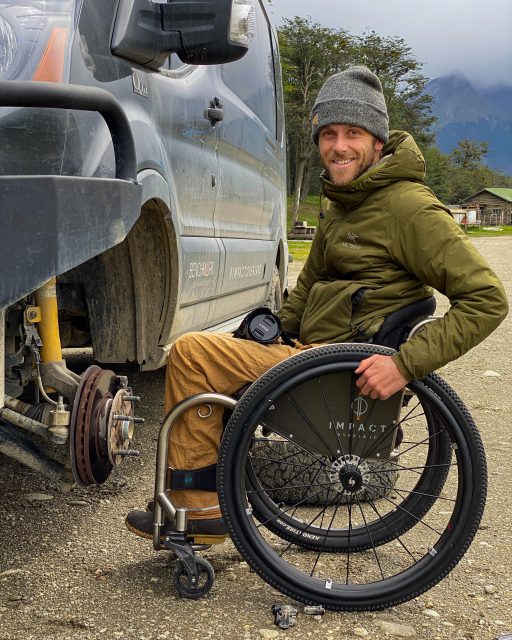
My daily challenges are drastically different than for most people. For instance, if I dropped a bag of M&Ms on the ground without having the dexterity, it could take me 30 minutes or more to pick them up. There are challenges all day, every day: having a shower, getting dressed, clipping my nails. The trick is to minimize and shrink your excess to a manageable level. So cooking isn’t so difficult, and getting in and out of bed isn’t so difficult. There are many rewards once you figure out an easier way to do things.
Your support and promote the Walkabout Foundation while traveling. Can you give me more information on the Foundation?

I started working with the Walkabout Foundation when I traveled to South America. I didn’t want it to be ‘Kirk’s Big Adventure’—I wanted to help people along the way. The more I travel, the more I realize that developing nations do not have access to wheelchairs, medical supplies, and basic healthcare. In a world where 100 million people require wheelchairs and over 60 million do not have access to one, it struck home to me. I then made it a goal as I traveled to not necessarily campaign and ask for money, but rather [to] educate people, allowing [them] to make a difference. When you give somebody a wheelchair, you give them independence, mobility, and freedom again, which is as powerful as it gets for me.
I know you have done much for the organization with your recent trip to Kenya, raising money while traveling, and your 5K #walkabout event. How can other people get involved?
People can campaign, volunteer, or help with distribution. I hate asking for money, but monetary donations do help. Three hundred dollars buys a wheelchair for somebody anywhere in the world and changes their life. People can also directly reach out to me at Impact Overland or the Walkabout Foundation.
You are an adaptive athlete. What gear or equipment do you use when out on the trails and biking?
Unfortunately, not only do my legs and abs not work, but I have no grip in my hands, so my adaptive equipment is specialized and very important in my life. For me to recreate outdoors, I have an off-road hand-cycle which is the main thing I ride, and I really love it. I pedal with my arms. It has an electric assist motor so I can go 20-40 miles instead of 3-4 miles.

I’ve played on a wheelchair rugby team, I’ve tried scuba diving and paragliding, and pretty much anything adventurous. I am fortunate to live in the state of Colorado, which has a lot of adaptive outdoor sports. I have an adapted side-by-side Polaris Razor with hand controls that is the ultimate off-road buggy/wheelchair to explore Moab, Silverton, or mountain and forest roads.
Tell us more about your trip from the US to Patagonia in 2019
It was three years in the making to figure out the van, getting sponsorships and funding to get my brother to join me on the trip. He rode a motorcycle while I drove the van. We shipped the van close to Santiago in Chile, and it took four months to drive down to Ushuaia. We were working our way back up through Argentina towards Colombia via Brazil, Peru, and Bolivia when Covid shut down the whole world. We then spent four and a half months in an apartment in Buenos Aires trying to ride out the storm to make sure it was real.

Even though the trip was short-lived, some of the highlights were being able to fill up our water from the streams in Patagonia without filtering it. Literally drinking from a stream—that’s pretty memorable. The people we met, of course, and the landscapes were incredible. Besides the language barrier, it quite honestly went pretty smoothly. Stuff went wrong, but it didn’t phase us. It’s the little things in life that matter; having a flat tire or getting stuck is not that big [of] a deal.
One of the most rewarding things was spending all that time with my brother. He’s four years older than me, married now and living in San Francisco. They are expecting a baby, and I only get to see him a couple of times a year. Being able to spend so much time with him so late in our lives and just having that special bonding moment was probably the highlight. Somehow we got along the entire time and didn’t bump heads; it was pretty remarkable.
How do you afford to travel?
I purchased the basic cargo van, and I had a chunk of change left. I am fortunate to live in Colorado, which has a good disability program, and I was able to get my van modified with the assistance of an organization called Vocational Rehab. This took over a year, and I had to prove that I could earn an income from my current drone, film, and photography business, Birds Eye Optics. The organization is about getting people back to work, and I proved to them that I required a vehicle to earn a living.
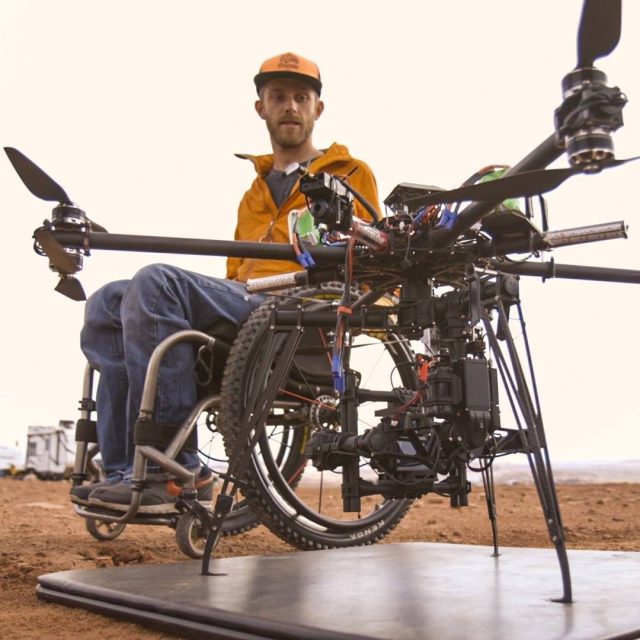
I have owned Birds Eye Optics for several years now and take pictures and drone videos of real estate, [for] music videos, car commercials, etc. I work with different publications such as New Mobility, a magazine that covers adaptive sports, and with some other partners on their social media platforms [and] web design. I also get a grant from the government for my disability, and if I am frugal and smart, I can get out there and do stuff.
What vehicle do you currently overland with, and what modifications did you make to the vehicle?
I currently own a 2017 Ford Transit van I designed from the ground up. I had two other GMC fire trucks and a Ford before I worked out what layout would work best—what was critical, and what wasn’t. It is a four-wheel-drive platform, and I have a Quigley four-wheel-drive conversion by SuperArm, a company that makes the wheelchair lift.

The whole interior layout, from where the bed is to where the buttons are to how I roll under the sink to why the fridge is up in the air—these are all adaptations specially designed with no grip and no ab control in mind. It is how I can function best in my little freedom shuttle, [or] my freedom pod as I like to call it. Everything works efficiently when I am in the van, and when I step outside, life gets hard again.
You have owned and modified a couple of vans. Do you have any tips or tricks for other wheelchair users when modifying their vehicles to make travel and day-to-day living easier?
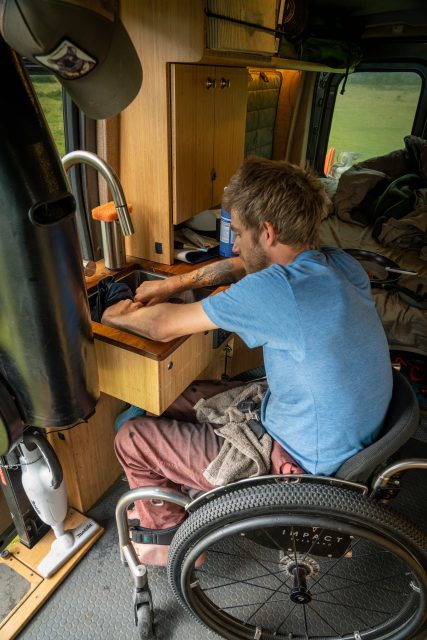
The big thing I tell people looking to get into this is that you don’t need all the bells and whistles. The van I have now has almost everything I can dream of. [However,] I spent years just traveling in my GMC Savana that I still own that only has a bed platform in the back, and that’s enough to get me out camping for a weekend. I always push people to use what they have; don’t get so caught up in having all the sweet gear that you end up never going on the trip. It’s not worth it. So, start with what you have and try to modify that. For me, the biggest thing is where I can sleep and where I can go to the bathroom. Other than that, I can figure out where to get food. I can make sandwiches, go to a restaurant nearby town, or build up from there.
You recently adopted a dog. Can you tell me more about him and if he has changed the way you travel at all?
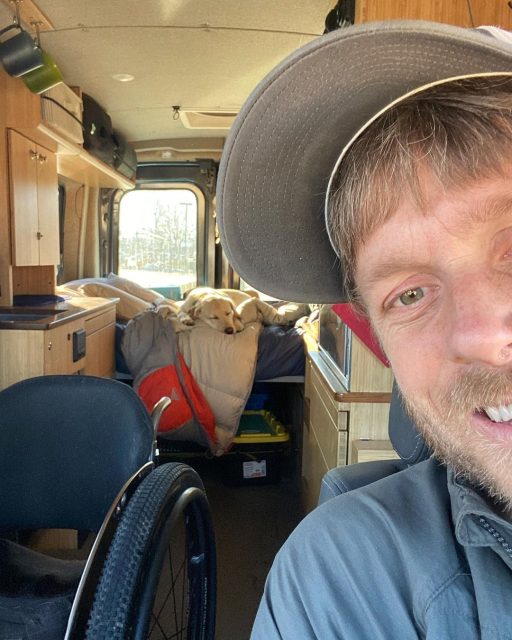
I do have a new dog called Maddox. I had a Labrador before him named Bella, and she traveled everywhere with me. Maddox came from the same breeder. As Bella was getting older, I knew I needed to get another dog and have some overlap, and I had hoped Bella would still be around a bit longer, but she passed away a year ago. So now we’ve got this little crazy man; he’s almost two. He’s a handful at times, and I have to embrace that there’s going to be dog hair and other challenges that come along with it, but it’s worth it for me. I would be lost without dogs, and I love him with every ounce of my soul, so he’s in it whether he wants to be [or not]. Fortunately, he loves traveling, being in the van, and just laying on the bed looking out the window, checking out new places, and going on bike rides. He’s my number one companion.
You keep pushing yourself to new limits by making adventurous trips; what advice or guidance can you give to other wheelchair users to motivate them to do the same?
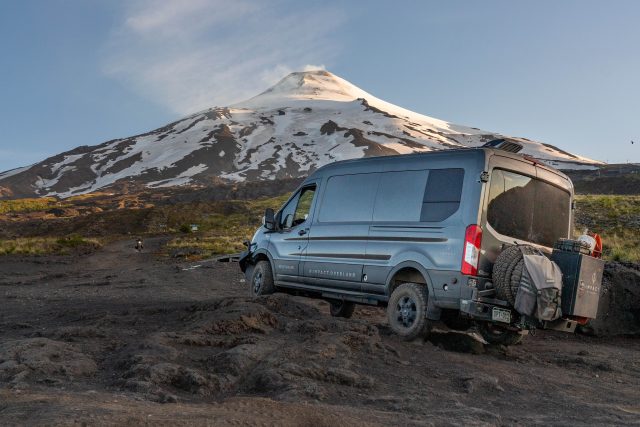
Over the years, I’ve realized that I do like to push myself, and I do like to get out of my comfort zone and try new things or experiences. It is worth the struggle and the effort for me, but that’s not necessarily what everybody wants to do, and that’s okay. If you like doing something adventurous, don’t be afraid to try and do it. Say yes, and frame a lifestyle around that hobby or sport so that you can ultimately do what you love as much as you can. All this boils down to [is] enjoying this short time we have on this crazy little planet.
Social media:
Instagram: impact.overland
Website: impactoverland.com
Facebook: impact.overland
YouTube: Impact Overland Story
Our No Compromise Clause: We carefully screen all contributors to ensure they are independent and impartial. We never have and never will accept advertorial, and we do not allow advertising to influence our product or destination reviews.


